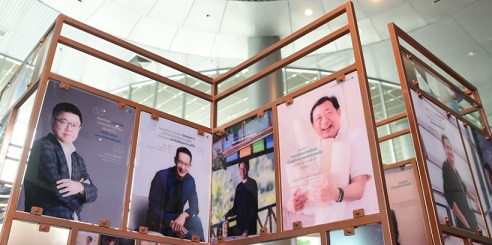National Innovation Agency (Public Organisation) or NIA, under the Ministry of Higher Education, Science, Research and Innovation (MHESI), is on a mission to buff up Thailand’s image as a country of innovation, through the presentation of successful companies. They are also pushing for a model of innovation for the MSME sector after discovering that this
National Innovation Agency (Public Organisation) or NIA, under the Ministry of Higher Education, Science, Research and Innovation (MHESI), is on a mission to buff up Thailand’s image as a country of innovation, through the presentation of successful companies.
They are also pushing for a model of innovation for the MSME sector after discovering that this sector could still not fully access innovation. It has also unveiled The Founder II, a book to present the perspectives of 25 individuals who can build a path to survival during crises: Pandemic: The founders of companies able to adapt during the COVID-19 crisis; Climate Change: The founders of companies addressing global climate change; and Economic Crisis: The founders of companies whose operations are consistent with the new global economic context, stimulating the use of “innovations in thinking to create different paths for survival,” as well as promoting real Thai use cases able to be implemented in a concrete fashion.
Dr. Pan-arj Chairatana, Director of the National Innovation Agency (Public Organization) or NIA, disclosed that the NIA had the goal of promoting Thailand’s image as “Innovation Country” with a focus on powering overall scene of national innovation to make the top 30 global rankings. Regarding this, the ability of Thai innovation to grow in leaps and bounds relies on the key factor of a strong private sector as the motor. This sector has the potential, both to provide jobs and bring in revenues to the country as well as various investments with an impact mainly on economic value. The sector has a key role in creating memorable images about the strength of national innovation, whether in services, manufacturing, transformational processes in urban contexts, or stakeholders.
2020 and 2021 have been a period for the Thai private sector to adapt its capabilities in innovation at a good level. It has a share of total budgets spent on research and development. Investment by Global Level 1 companies (WIPO Global IP Rankings) is averagely still at 1% of GDP, which reflects investment of this sector which requires to boost its capable business capabilities by developing innovations, including points which are used to create the survival path with more competition. However, despite investment in innovation being at a good level, it is still clustered in industry – large enterprises or startups. A crucial segment such as MSME still requires more attention and awareness to drive further innovation. The data show people with access to innovation still less than 1%, or only about 30,000 individuals out of 3,000,000.
“Some businesses have the problem of lacking implementation of innovation assembled with many other factors, whether finance, lack of manpower, formats of innovation or suitable processes. The most important thing is ‘knowledge and understanding’, in which many people have the idea or belief that innovation is only a matter of high tech. We want to show that innovation needn’t be a distant thing. How is Thailand’s innovation? Companies which have been successful at deploying innovation have the processes in place with the capability to adjust manufacturing or services in different formats. Eventually, when people’s memories have changed, there is inspiration, and this gives clarity to Thailand’s innovating companies and brands, which become more abundant.”
Dr. Pan-arj added that the NIA had launched The Founder II to present the perspectives of model individuals founding innovative companies in Thailand. This is focused on giving the business sector or young individuals with the determination to operate a business, to get to know about 25 individuals with innovation capabilities for building paths to survival for their businesses during the crisis (Innovation in Time of Crisis), including Pandemic: The founders of companies able to adapt during the COVID-19 crisis; Climate Change: The founders of companies addressing global climate change; and Economic Crisis: The founders of companies whose operations are consistent with the new global economic context. The Founders in all 3 categories are models for “innovation in thinking”, showing examples of thinking and formats which enable products and services to survive in conditions we must all face together. They are Thai use case studies rather than the western ones we are used to. Thai innovation is interesting in the manner of meticulous detail, and the integration of art and science, which is different from elsewhere. The Founder II book is expected to underline how people have been giving more attention to thinking and practices, to see the importance of research and development, which leads to creating innovation in thinking. There are infinite objects of value which can be manufactured, and it is the same with Thai innovation, which will also continue unceasingly into the future.
Entrepreneurs or anyone with an interest in business can download The Founder II to read as an e-Book or see a virtual exhibition at https://thefounder.nia.or.th/ from today onward, for free!


